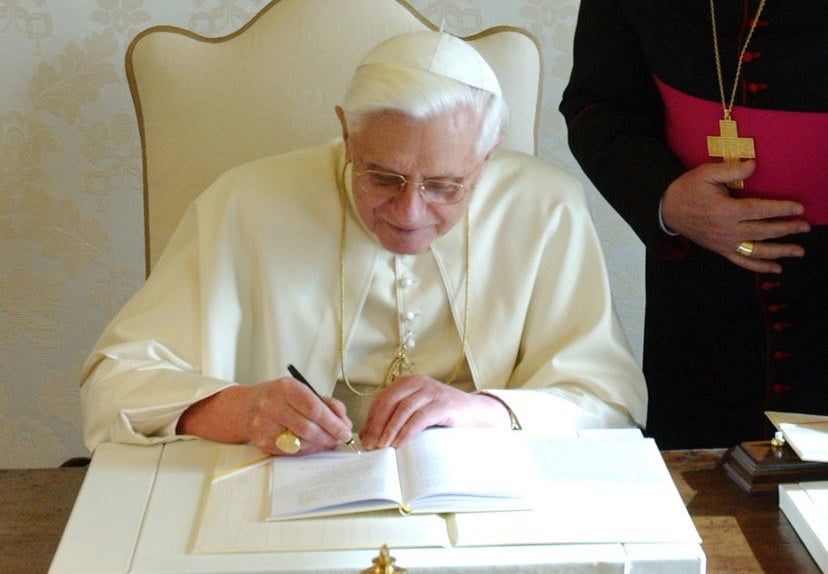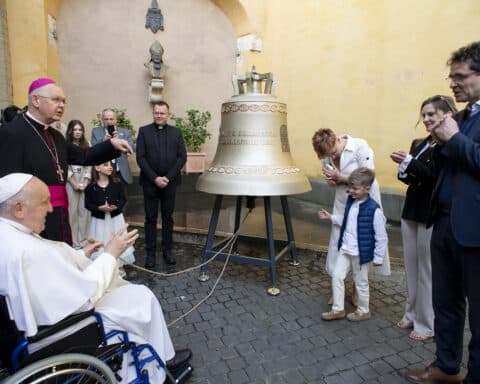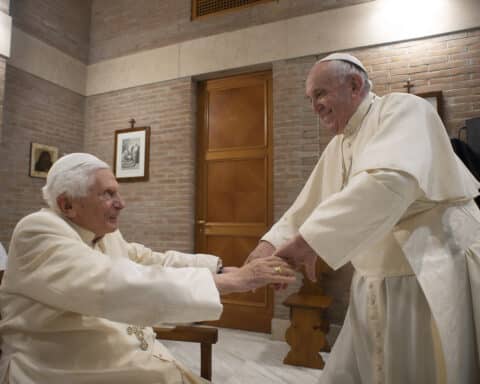One of the best-known charitable organizations in the world, the Society of St. Vincent de Paul, may owe its founding to an atheist. In 1833, at the Sorbonne, a student identifying himself as an unbeliever challenged the faith of his schoolmate Frederic Ozanam, who was well-known as a defender of the Catholic Church. The student said to Frederic: “And you, who pride yourself on your Catholicity, what are you doing now for the poor? Show us your works.” Frederic accepted the challenge. He and his friends began offering relief to those in need in the poor neighborhoods of Paris. Thus, the Society of St. Vincent de Paul began and has continued its charitable works ever since.
Fast forward to 1999, again at the Sorbonne, and one finds the debates concerning Christianity and its truths still being argued. This time the defender is Cardinal Joseph Ratzinger, the future Pope Benedict XVI, who gave a lecture entitled “The Truth of Christianity.” In his remarks, Ratzinger said that Christianity is convincing based not on theory alone but on “a combination of knowledge and action,” “action [that is] oriented to caritas, to caring for the suffering, for the poor and weak independently of social or circumstantial differences.” This notion of “caritas” – or the practice of love — would be developed more fully in Pope Benedict XVI’s first encyclical, Deus Caritas Est (“God Is Love”; Dec. 25, 2005)
Context
Pope Benedict XVI wrote Deus Caritas Est “to call forth in the world renewed energy and commitment in the human response to God’s love” (No. 1). He was well aware, as he had been at the Sorbonne six years before, that many people associated God “with vengeance or even a duty of hatred and violence” (No. 1). Sadly, one cannot deny that there have been extremist groups and terrorists who hijack the name of God to validate their hate. The antidote, the pope says, is for Christians to actively witness to the heart of their faith, as expressed concisely in the First Letter of John: “God is love, and he who abides in love abides in God, and God abides in him” (4:16).
Content
To support those who want to be Christian witnesses, the pope divides Deus Caritas Est into two parts that address the basic elements of a response to God’s love. In the first part, he considers “the love God lavishes upon us” and clarifies “some essential facts” concerning God’s love (No. 1). The second part describes the call to “share [God’s love] with others.” Specifically, the pope “treats the ecclesial exercise of the commandment of love of neighbor” (No. 1).

Pope Benedict begins his comments on God’s love by showing how two Greek terms, eros and agape, have influenced Church teaching. Eros is used twice in the Greek Old Testament to describe marital love, a love that moves one to want the other not for “a moment of intoxication” but for happiness and fullness forever (Nos. 3-6). Agape, the preferred term for love in the Greek New Testament, signifies “concern and care for the other;” it is not “self-seeking” but “seeks the good of the beloved” (No. 6).
The challenge for human beings is to practice eros and agape together, to both receive and give love. When “the two dimensions are totally cut off from one another, the result is … an impoverished form of ‘love'” (No. 8). Eros by itself can be reduced to “possessiveness” or the merely sexual, and agape without eros leads to dryness, for one “cannot always give. … Anyone who wishes to give love must also receive love as a gift” (No. 7).
For God, who is love, there is no contest between the different dimensions of love. Pope Benedict writes that God’s love “may certainly be called eros, yet it is also totally agape” (No. 9). Indeed, the Bible describes “God’s passion for his people using boldly erotic images.” God desires a love-relationship with his people (No. 9), even giving them his law so they know how to honor their bond with him. At the same time, God bestows love (agape) on humanity “in a completely gratuitous manner,” even forgiving man and woman when they have sinned (No. 10).
About God’s agape manifested in forgiveness, Pope Benedict offers a startling perception that is worth repeating: God’s love for humanity “is so great that it turns God against himself, his love against his justice. Here Christians can see a dim prefigurement of the mystery of the Cross: so great is God’s love for man that by becoming man he follows him even into death, and so reconciles justice and love” (No. 10).
Read more from our Church Document series here.
An important consequence to sharing in the Eucharist is its social character (cf. No. 14). When we partake in the Eucharist, we become members of the Mystical Body of Christ with all other Christians. “Love of God and love of neighbor are truly united” (No. 14). We also perceive the Lord’s presence in each other and in his words that form and shape us as we yield to them. In the Eucharist, God “loves us, he makes us see and experience his love, and since he has ‘loved us first,’ love can also blossom as a response within us” (No. 17).
Call
“Since God has first loved us (cf. 1 Jn 4:10),” Pope Benedict writes, “love is now no longer a mere ‘command’; it is the response to the gift of love with which God draws near to us” (No. 1). Indeed, Jesus incorporates us into himself so that we may share in his life now and in eternal life. We can even love “in God and with God … the person whom I do not like or even know” (No. 18). Such a gift frees us to love our neighbor.

Love of neighbor may be “first and foremost a responsibility for each individual member of the faithful, but it is also a responsibility for the entire ecclesial community,” from the parish to the universal Church (No. 20). In Deus Caritas Est, Pope Benedict focuses on the communal response of love that becomes an ordered “service of charity,” not only to fellow members but also to our brothers and sisters outside the Church (cf. Nos. 22, 25).
Some people argue that the Church’s charitable activities ultimately do little for those who are poor and even exacerbate poverty. What the poor really need is justice, so they have access to their share of the world’s goods (cf. No. 25). The Church agrees in justice for all, and Catholic social teaching has developed over the years to indicate, based on the fundamental principle of human dignity, what constitutes a just society. However, it is the responsibility of the civil authorities “to bring about the most just society possible” (No. 28).
The Church community, by its practice of charity, provides what the state cannot: “loving personal concern” (No. 28). Indeed, the Church “acts as a subject with direct responsibility, doing what corresponds to her nature” (No. 29). In this duty, the Church cooperates with the State. “She cannot and must not replace the State” but neither can she “remain on the sidelines in the fight for justice” (No. 28).
At the same time, Pope Benedict emphasizes that the ecclesial exercise of love of neighbor must never lose its “splendor” by becoming “just another form of social assistance.” Charity workers need to be trained to meet the needs of people, but professional competence is not enough. They also need a “formation of the heart,” “to be led to that encounter with God in Christ which awakens their love and opens their spirits to others” (No. 31). As they continue to listen to Jesus’ words and receive his body and blood, they develop a prayer life — “a living relationship with Christ” (No. 36) — which helps them avoid the dangers of inertia or thinking they can fully resolve every problem. Eliminating poverty is a duty. Witnessing to God’s love is the mission.
The Lord said, “one can become a source from which rivers of living water flow (cf. Jn 7:37-38). Yet to become such a source, one must constantly drink anew from the original source, which is Jesus Christ,” who followed us here so we can follow him to eternal life (No. 7).





